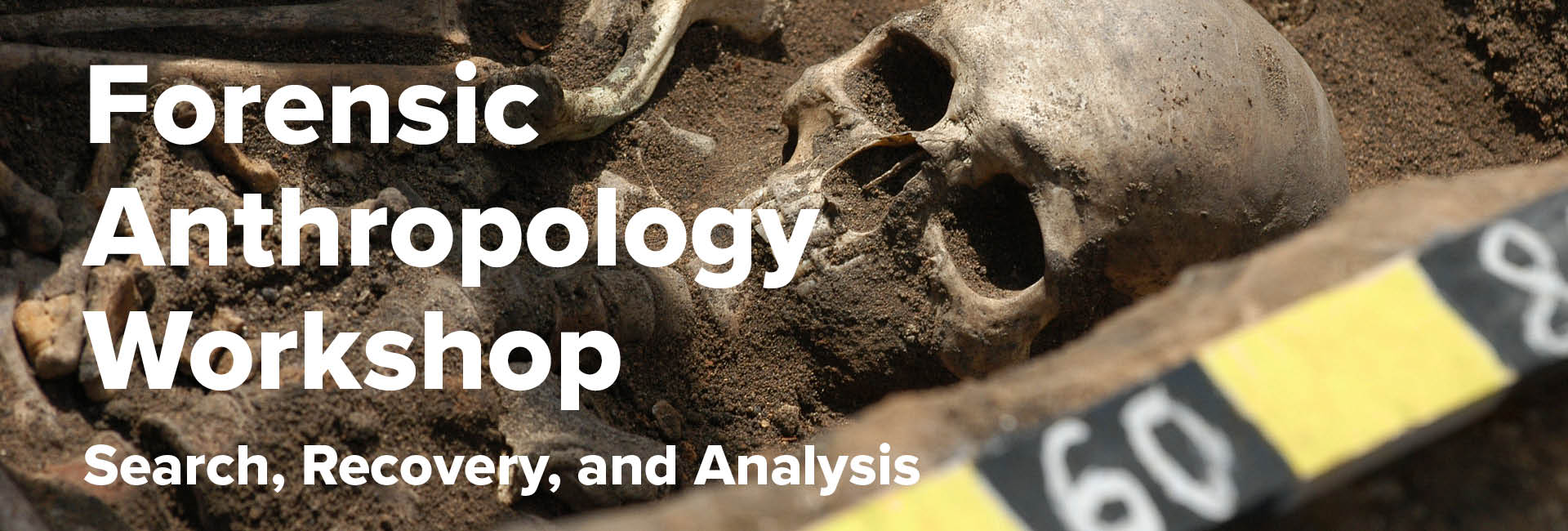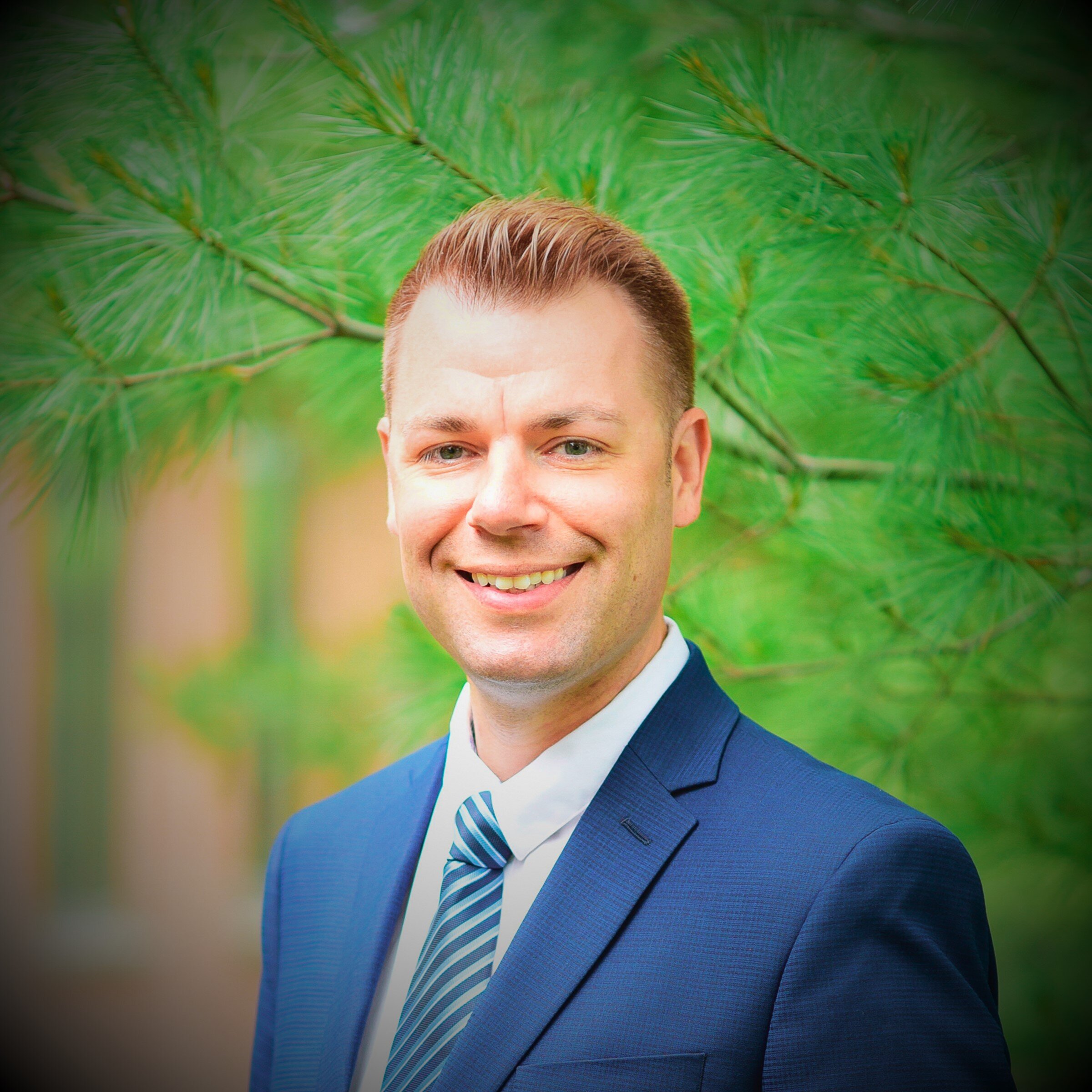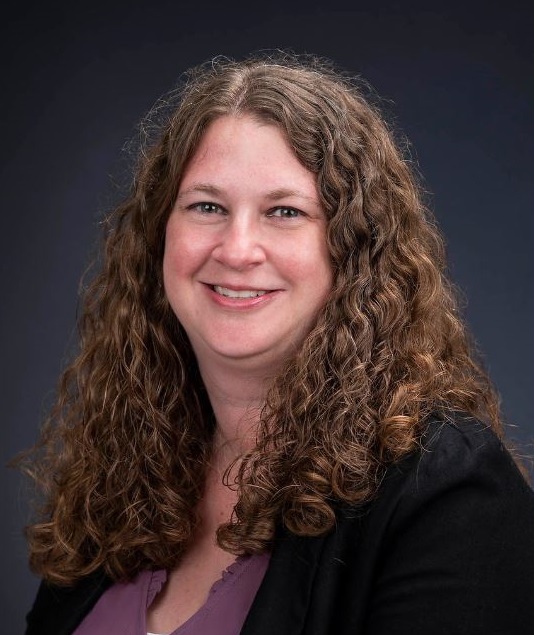Health and Human Services
Maintain your social work or health care related license or certification with quality, convenient, and affordable options to gain Continuing Education Units at UW-Parkside! One tenth of a CEU (0.1) is granted to an individual for every hour of participation in an organized continuing education experience. Similarly, each hour may also be expressed as a Continuing Education Hour or CEH, with one CEH granted per hour of participation.
Available Trainings

- Type: In Person
- Start Date: 06/17/2024
- End Date: 07/12/2024
- Meeting Time(s): M, W, F | 7:45 AM - 11:10 AM
- Cost: $849 before 4/15, then $999 (10% if register after 6/3)
- Credits: ABMDI (40 credit hours), POST/LESB and Department of Safety and Professional Services credits pending
Participants will gain an understanding of the foundations of forensic archaeological recovery and forensic anthropology analytical methods. This course is meant to introduce the tools that anthropologists have at their disposal and to increase participants' ability to recognize and analyze potential scenes of human remains in their present or future careers, or in collaboration with law enforcement and other forensic professionals.
Keith Biddle, PhD
Assistant Professor, Criminal Justice Department, UW-Parkside
Dr. Biddle teaches in both the Criminal Justice and Anthropology departments. Courses include: Forensic Evidence, Forensic Anthropology, Criminalistics, Introduction to Human Evolution and Advanced Human Evolution, Forensic & Mortuary Archaeology, and more.
Participants will walk away with the following:
- Knowledge of survey and search methods
- Factors that affect recovery attempts such as decomposition, PMI, and taphonomic influences
- Evidence collection techniques and chain of custody
- Forensic photography methods
- Report Construction
What materials are needed for this course?
Since some of the course will take place outdoors, it is recommended that participants bring the following on those days: Water, snacks, sunscreen, insect repellant, any relevant medications (including allergy meds), head covering, sunglasses, and rain gear. Gloves and masks will be provided by UW-Parkside.
Is this course being offered for college credit?
This course is offered for both credit and non-credit seeking students. The registration page linked to this course card is for non-credit seeking students. If you are interested in receiving college credit for taking this course, please contact our Registrar's Office, at 262-595-2284, or registrars.office@uwp.edu.

- Type: Live Online
- Start Date: 09/20/2024
- Meeting Time(s): 1:30-4 PM
- Cost: $99 early bird (until 8/20), then $129
- Credits: 0.25 CEUs/2.5 CEHs
How do I support a youth who identifies as LGBTQIA2S+? What do all of the letters mean? What is PRIDE? What contributions have LGBTQIA2S+ people made to our world? What defines the culture? This workshop will develop and enrich your knowledge of the LGBTQIA2S+ culture, community and share the history of the struggles faced. Do you know and understand the history of the Gay Rights Movement? We will also explore what youth are experiencing in today’s political and community environment. We will learn the ‘lingo’ and gain an understanding of personal identity development, the coming out process, and examine supportive steps you can take to help youth in your care and community.

Dana Johnson
Dana Johnson from Wisconsin is a career social worker, practicing in senior level management in state government, county human services, an educator in higher education, and operating a consulting and professional development firm. His experience includes child welfare practice, policy, and reform; transformational organizational leadership and culture change, supervision of teams, continuous quality improvement, and dynamic equity, diversity, and inclusion efforts across micro, mezzo, and macro systems.
Dana did a wonderful job with this presentation and material included. He was very insightful and touched on topics most people shy away from. Disclosing his own personal expereinces help to connect the material provided. Thank you! - Ethics and Boundaries participant Dec 2023
I have been going to Parkside for continued education for years. I have never been disappointed. The education has always been excellent and the staff friendly. - Ethics and Boundaries participant Dec 2023

- Type: Hybrid (In-person and Live Online)
- Start Date: 11/13/2024
- Meeting Time(s): 9:00 AM - 11:00 AM CST
- Cost: FREE
- Credits: .2 CEUs/2 CEHs
The University of Wisconsin-Parkside Professional and Continuing Education Office, as part of the UW-Parkside Guest Lecture Series on Aging, and the Helen Daniels Speaker Event Series supported by Bader Philanthropies, is pleased to host Professor Angela Roberts as our lecturer for this year's event!

 Professor Angela Roberts
Professor Angela Roberts
Professor Angela Roberts holds a joint appointment in the School of Communication Sciences and Disorders and Department of Computer Science at Western University in Toronto, Canada. She is also a speech-language pathologist. Dr. Roberts is the Canada Research Chair in Data Analytics and Digital Health in Cognitive Aging and Dementia. She is a founding Co-Director of Western’s Collaborative Specialization in Machine Learning in Health and Biomedical Sciences and is a Research Associate with the Canadian Centre of Activity and Aging.
Her impactful research program improves cognitive aging outcomes through rigorously validating connected speech signatures that detect and monitor cognitive decline, building phenotypes and predictive models of cognitive aging trajectories, and developing interventions that address communication challenges experienced by persons with dementia and their families. Her clinical research program uses telehealth service delivery systems that have a global reach. She is the Canadian lead for the SuperAging Research Initiative, a study examining factors associated with exceptional cognitive aging. Her influence extends to health charity organizations as a research board member for Parkinson Canada and an author of internationally distributed patient and family education materials.
Professor Roberts’ work is funded by the Ontario Brain Institute, the Canadian Institutes of Health Research, and the National Institutes of Health (U.S.), including an early investigator award from the National Institutes of Deafness and Other Communication Disorders.
This event will take in-person in the University of Wisconsin-Parkside Student Center Ballroom.
Participants can opt to attend in-person or online via Zoom.

- Type: Online, Self-Paced
- Start Date: Open Enrollment
- End Date: 12 months
- Cost: $2,595
- Includes: Course Materials and Certificate
The Medical Interpreter training course prepares you to work in hospitals, medical offices and in any healthcare environment where a Spanish interpreter is needed. In addition, the Medical Interpreter training course prepares you to sit in any of the Medical Interpreting examinations available in the country. This course is language-specific – Spanish/English.
Prerequisites: You must speak English and Spanish fluently.
This program is offered in partnership with ed2go/Cengage.
Nestor Wagner
Nestor Wagner is a certified Court and Medical Interpreter who has been teaching interpreting courses since 1990. He has the highest pass rate of certified court interpreters in the nation. He has published several books in the interpreting community. Mr. Wagner is involved in the examination process for Immigration Interpreters and Analytical Linguists. He participates as a speaker in national and international conferences on Criminal, Civil, and Immigration Court terminology, advanced interpreting skills, and localization in the transfer of legal and non-legal terminology. Mr. Wagner holds a Master's degree from the University of Washington.
What you will learn
- Develop best practice interpreting techniques - simultaneous, consecutive, and sight translation
- Learn medical terminology in both Spanish and English and the corresponding transfer into the opposite language
- Understand protocol when interpreting for a Spanish-speaking patient
- Master the code of ethics of the medical interpreter
- Study the necessary material to sit in any Spanish Medical Interpreter examination
- Develop professionalism, accuracy, and a mastery of cross-cultural differences
Syllabus
- Introduction to Medical Interpretation I
- Medical Vocabulary – The Human Body
- Pre-anesthesia record form
- Medical Vocabulary – System and Senses
- Refusal to permit blood transfusion
- Medical Vocabulary – Signs and Symptoms
- Medical Condition form
- Intravenous Contrast Injection Consent
- Medical Vocabulary - Facilities and Staff
- Discharge Instructions
- Colloquialism
- Medical Vocabulary - Treatment Procedures, Instruments, Supplies and Medications
- Industrial Accidents - Workers' Compensation
- Medical Vocabulary - Pregnancy and Delivery
- Simultaneous Techniques
- Consecutive Techniques
- Interpreting Laboratory Practices
- Introduction to Medical Interpretation II
- Medical Vocabulary - Pediatric/Neonatal Care
- Medical Vocabulary - Family Planning
- Interpreting for Hospitals – Parents' Rights & Responsibilities
- Medical Vocabulary - Communicable Diseases
- Interpreting for Hospitals - Taking Care of Mom
- Interpreting for Hospitals - The "Baby Blues"
- Medical Vocabulary - Sexually Transmitted Diseases
- Interpreting for Hospitals - Consent for Cath Lab Procedure
- Medical Vocabulary - Dental Health
- Interpreting for Hospitals - Environmental History Form for Pediatric Asthma Patient
- Medical Vocabulary - Substance Abuse
- Interpreting for Hospitals - OSHA Required
- Idiomatic Expressions - English into Spanish
- Interpreting for Hospitals - Adult History Form
- Interpreting for Hospitals - Authorization for Use or Disclosure of Imaging Information
- Legal Terminology used in Medical Matters
- Interpreting for Hospitals - Advance Directive
- Interpreting Laboratory Practices
- Sight Translation for Medical Interpreters
- Principles of localization
- Re-structuring techniques
- Principles of reversibility and non-reversibility of Medical terms
- Interferences – Filtering syntactical and grammatical interferences
- Style in the delivery
- Exam taking techniques - Objective versus subjective grading
- Transferring of low, regular and high register documents into the opposite language
- Stability in the transfer
- Interpreting Laboratory Practices
Prerequisites:
You must speak English and Spanish fluently. There is no requirement regarding formal education in either Spanish or English. However, you must be able to speak English and Spanish without any hesitations.
You should be familiar with using a personal computer, mouse, and keyboard. You should be comfortable in a Windows or Mac environment, and have the ability to launch and close activities.
Requirements
Requirements:
- Hardware Requirements:
- This course can be taken on either a PC or Mac.
- Software Requirements:
- PC: Windows 8 or later.
- Mac: macOS 10.6 or later.
- Browser: The latest version of Google Chrome or Mozilla Firefox are preferred. Microsoft Edge and Safari are also compatible.
- Adobe Acrobat Reader.
- Software must be installed and fully operational before the course begins.
- Other:
- Email capabilities and access to a personal email account.

- Type: Online, Self-Paced
- Start Date: Open Enrollment
- Cost: $3,195.00
- Includes: Instructional materials and Certificate
Spanish is the most spoken non-English language in the U.S., sparking the need for professional interpreters. If you're bilingual in both English and Spanish, you can use your fluency to help others communicate. As a professional interpreter, you can assist those in vulnerable situations, such as refugees and immigrants, acting as their communication bridge. This comprehensive bundle of courses will prepare you for a rewarding career as a professional English-Spanish interpreter. Not only will you master interpretation, you will also learn to interpret in a medical setting and be prepared to sit for your state's medical interpreter certification exam.
Prerequisites: You must speak English and Spanish fluently.
This program is offered in partnership with ed2go/Cengage.
Rocío Txabarriaga
Rocío Txabarriaga, MA is vice president of Content Development and co-founder of the Virginia Institute of Interpreting. She is responsible for course planning, development, validation, and maintenance. Ms. Txabarriaga has over 20 years of experience in language services and international business management ranging from independent consulting to senior executive positions, and business ownership. Her extensive experience spans operations, ISO-quality processes, interpreter recruiting and training, qualitative and quantitative research and analysis, as well as in-depth involvement with several language technology platforms. Ms. Txabarriaga has several degrees, including a master's degree from Monterey Institute of International Studies, has earned many certificates, and speaks five languages fluently. Ms. Txabarriaga is also a NASBITE-Certified Global Business Professional and an accomplished writer and public speaker.
Nestor Wagner
Nestor Wagner is a certified Court and Medical Interpreter who has been teaching interpreting courses since 1990. He has the highest pass rate of certified court interpreters in the nation. He has published several books in the interpreting community. Mr. Wagner is involved in the examination process for Immigration Interpreters and Analytical Linguists. He participates as speakers in national and international conferences on Criminal, Civil and Immigration Court terminology, advanced interpreting skills, and localization in the transfer of legal and non-legal terminology. Mr. Wagner holds a Master degree from the University of Washington.
What you will learn
- Learn how to transfer information in multicultural situations
- Develop interpreting-specific skills such as short-term memory retention, shadowing, note-taking, sight-translation, consecutive interpreting, and more
- Develop best practice interpreting techniques – simultaneous, consecutive, and sight translation
- Understand protocol when interpreting for a Spanish-speaking patient
- Master the code of ethics of the medical interpreter
- Understand all material tested in a Spanish Medical Interpreter exam
Syllabus
- Professional Interpreter
- Introduction
- Learning Styles Assessment Exercise
- Basic Concepts of Language Interpreting
- Basic Concepts: What is language interpreting? What is language translation?
- Contrasting the interpretation and translation tasks
- Translation and adaptation: Localization and transcreation
- What does it take to become a professional interpreter?
- Certificate vs. Certification vs. Professional Licensure
- Where do interpreters work?
- Message delivery: The techniques
- Consecutive interpreting video demonstration
- Sight translation video demonstration
- Review Questions
- On-Site interpreting
- Remote and Telephonic Interpretation
- Telephonic interpreting, continued
- Video remote interpreting and video relay interpreting
- Sight translation
- Vocabulary Game
- Review Questions
- The Evolution of Interpreting in the Community
- The Evolution of Interpreting in the Community: Steps Toward Professional Recognition
- The Evolution of Interpreting in the Community: Professional Associations
- Public Services Interpreting Drivers
- Standards Guiding the Interpreting Profession
- Associations: Why are they important?
- Module 1 Self-assessment
- Resources
- Module Feedback
- Interpreting Skills and Techniques
- Preparing yourself for this module
- Active listening
- Active listening: Suspending yourself
- Emotions and Culture
- Level of Interest and Objectivity
- Capacity to Concentrate
- Who you are influences greatly the way you listen and communicate
- Listening Exercises: Introduction
- Shadowing: Introduction
- Short-Term Memory Retention: Visual
- Short-Term Memory Retention: Auditory
- Note-Taking
- Sight Translation: Introduction
- Putting It All Together: Interpreting
- Module Vocabulary Game
- Module 2 Self-Assessment
- Resources
- Module Feedback
- Ethics and standards: Expected professional behavior
- What are Professional Standards?
- The Interpreter's Professional Profile
- Accuracy
- Acting Ethically and Honestly
- Confidentiality
- Competence
- Neutrality
- Reliability
- Respect for the Profession
- Role Preservation
- Scenarios and Exercises
- Resources
- Module 3 Self-Assessment
- Module Feedback
- The Business of Interpreting
- Basic public services interpreting market concepts
- The Supply
- The Demand
- Working as a freelance interpreter
- Interview video
- Working as a Full-time Interpreter
- Interview video
- Building a Resume
- Formatting a resume
- Resume Sample
- Writing a Cover Letter
- Joining professional associations
- Joining online professional directories
- Continued Education
- Resources
- Module Feedback
- Medical Interpreter
- Introduction to Medical Interpretation I
- Medical Vocabulary – The Human Body
- Pre-anesthesia record form
- Medical Vocabulary – System and Senses
- Refusal to permit blood transfusion
- Medical Vocabulary – Signs and Symptoms
- Medical Condition form
- Intravenous Contrast Injection Consent
- Medical Vocabulary - Facilities and Staff
- Discharge Instructions
- Colloquialism
- Medical Vocabulary - Treatment Procedures, Instruments, Supplies and Medications
- Industrial Accidents - Workers' Compensation
- Medical Vocabulary - Pregnancy and Delivery
- Simultaneous Techniques
- Consecutive Techniques
- Interpreting Laboratory Practices
- Introduction to Medical Interpretation II
- Medical Vocabulary - Pediatric/Neonatal Care
- Medical Vocabulary - Family Planning
- Interpreting for Hospitals – Parents' Rights & Responsibilities
- Medical Vocabulary - Communicable Diseases
- Interpreting for Hospitals - Taking Care of Mom
- Interpreting for Hospitals - The "Baby Blues"
- Medical Vocabulary - Sexually Transmitted Diseases
- Interpreting for Hospitals - Consent for Cath Lab Procedure
- Medical Vocabulary - Dental Health
- Interpreting for Hospitals - Environmental History Form for Pediatric Asthma Patient
- Medical Vocabulary - Substance Abuse
- Interpreting for Hospitals - OSHA Required
- Idiomatic Expressions - English into Spanish
- Interpreting for Hospitals - Adult History Form
- Interpreting for Hospitals - Authorization for Use or Disclosure of Imaging Information
- Legal Terminology used in Medical Matters
- Interpreting for Hospitals - Advance Directive
- Interpreting Laboratory Practices
- Sight Translation for Medical Interpreters
- Principles of localization
- Re-structuring techniques
- Principles of reversibility and non-reversibility of Medical terms
- Interferences – Filtering syntactical and grammatical interferences
- Style in the delivery
- Exam taking techniques - Objective versus subjective grading
- Transferring of low, regular and high register documents into the opposite language
- Stability in the transfer
- Interpreting Laboratory Practices
- Introduction to Medical Interpretation I
How you will benefit
- Have your professional profile listed in an employer-searchable directory
- Use your skill set to help a growing number of people in need of interpretation services
- Be prepared to start a career as a public services interpreter or medical interpreter
- Become ready to successfully take the medical interpreter certification exam
- Use your understanding of medical terminology in both Spanish and English to improve your marketability
Requirements
Requirements:
Hardware Requirements:
- This course can be taken on either a PC or Mac.
- Headphones or speakers.
Software Requirements:
- PC: Windows 8 or later.
- Mac: macOS 10.6 or later.
- Browser: The latest version of Google Chrome or Mozilla Firefox are preferred. Microsoft Edge and Safari are also compatible.
- Adobe Acrobat Reader.
Software must be installed and fully operational before the course begins.
Other:
- Email capabilities and access to a personal email account.
Instructional Material Requirements:
The instructional materials required for this course are included in enrollment and will be available online.
Prerequisites:
You must be fluent in both English and Spanish prior to enrolling in this course.
CEU Information by Profession
Wisconsin Licensed Social Workers: Our programs qualify as continuing education offered by an accredited university.
Wisconsin Licensed Marriage and Family Therapists: Our programs qualify as continuing education offered by an accredited university.
Wisconsin Licensed Professional Counselors: Our programs qualify as continuing education offered by an accredited university.
Wisconsin Substance Abuse Counselors: Programs qualify as continuing education courses consisting of relevant subject matter taught by qualified presenters.
Wisconsin Department of Public Instruction: Programs from the University of Wisconsin campuses may qualify towards your Professional Development Plans (PDPs).
Other Professions: Contact your professional board or organization for specific continuing education requirements.
The University of Wisconsin-Parkside is committed to providing access, equal opportunity, and reasonable accommodation in its services, program activities, education, and employment for individuals with disabilities. To request disability accommodations, contact Professional and Continuing Education at least eight weeks in advance at: 262-595-3340 (V), 262-595-2513 (FAX), or email continuing.ed@uwp.edu.

PROFESSIONAL AND
CONTINUING EDUCATION
Mon-Fri | 8 am-4:30 pm
Kenosha, WI 53144

